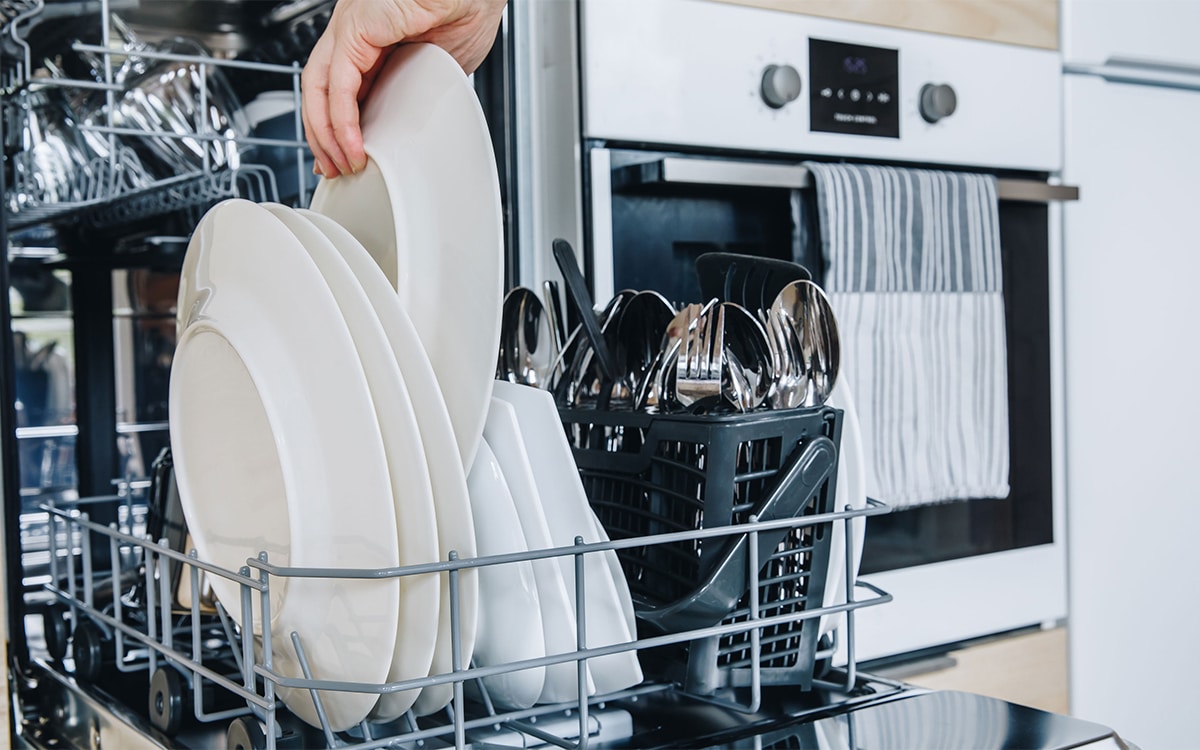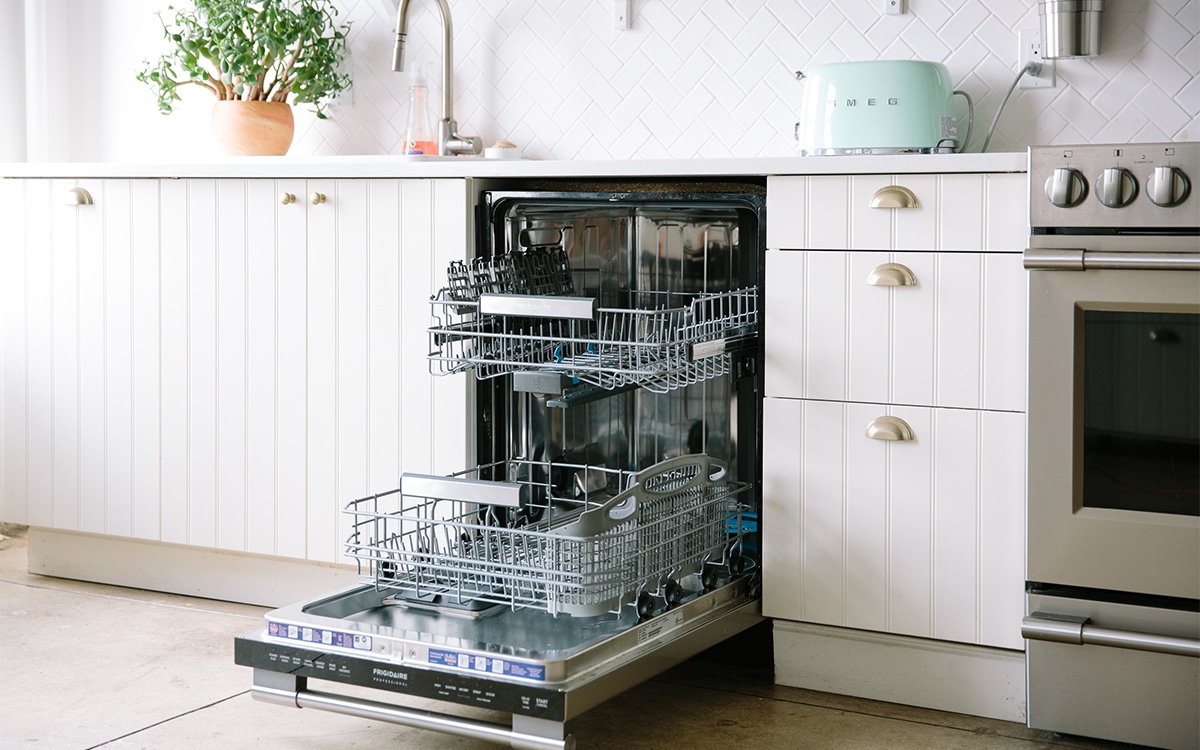As such, it’s always best to maximise the efficiency of a dishwasher, so that you can get the best results from it, without breaking the bank. This might get you wondering how you should be filling up your dishwasher. Is it best to fill it up as much as possible? Or is it actually more effective to fill it halfway?
If you want to make the most of your dishwasher, while also saving money, then this is the article you’re looking for. Today, we’re going to find out whether your dishwasher should be run half full, and how you can maximise its efficiency!
Should You Run A Dishwasher When It Is Half Full?
You should try to only run your dishwasher when it is full. When you set a dishwasher to perform a cycle, it will use the same amount of water, no matter how full the machine is. This means that only filling your dishwasher halfway will result in an incredible amount of water being wasted. In order to wash a full load of dishes in two goes, you will need to use twice the amount of water and electricity.
Half-filling your dishwasher effectively doubles the amount of water and electricity it uses! Instead, try to build up a full set of dishes before setting your dishwasher off. This ensures no water is wasted!
While there may be occasional exceptions, in which you may need to run the dishwasher half full, it is in your best interests to fill it up every time you start a cycle.
How Full Should Your Dishwasher Be Before Starting A Cycle?
This is an interesting question. While it’s important to fill your dishwasher up before using it, you want to be careful not to fill it too much. Overfilling your dishwasher can be just as inefficient as underfilling it. When you overfill your dishwasher, it’s harder for water to cycle around the machine and reach all of your dishes. This will result in dishes not being cleaned properly!
Luckily, dishwashers are specially designed to help prevent overfilling. The drawers in your dishwasher should have dedicated areas for you to stack specific dishes. For instance, the rows of prongs that stand up from the drawer are there to hold your plates upright as they wash. We would recommend only filling up the space that is available in your dishwasher. For example, don’t try to stuff two plates into a space designed for one.
If you ever find that your dishes still come out partly dirty, don’t panic. Just make sure to reduce the amount you put into the machine next time!
While you should fill your dishwasher as much as possible, you don’t want to overfill it. Be reasonable when loading your dishwasher, if you feel like you’re stuffing dishes in, it’s likely that you’re overfilling it!
Many modern dishwashers are able to detect how many dishes have been inserted, to make it easier to save water. They do this through the use of weight sensors. If the dishwasher notices that there is less weight in the drawers, then it will use less water and thus less power.

How Can You Make Your Dishwasher More Energy Efficient?
Fill It Up
It’s what this whole article is about! Easily the best thing you can do to maximise the efficiency of your dishwasher is to make full use of its capacity. Ensure your dishwasher is significantly full before starting a cycle so that no water gets wasted!
Don’t Bother Rinsing
Dishwashers are far more efficient than they once were. You might still feel the need to rinse every speck of food off of your plate before dropping it in the dishwasher. Luckily, modern dishwashers are able to deal with even the biggest messes. Rinsing your dishes ahead of washing uses up a significant amount of water, which you can easily cut down on!
Lower The Temperature
Some dishwashers allow you to choose a specific temperature for your water. If you want to use a little less electricity every time you turn it on, then lowering the temperature is a great option. Dishwashers heat up water first before using it to clean dishes. By lowering the temperature significantly, you can lower the amount of energy being used.
Use Your Dishwasher At The Right Time
If you really wanted to cut down on the cost of operating your dishwasher, you could wait to operate it during off-peak hours! Between the hours of 11 pm and 8 am, electricity is in less demand, as people turn in for the night. As such, running your dishwasher during these times could prove more cost-effective!
Frequently Asked Questions
Should You Run A Dishwasher Half Full?
No. You should do your best to avoid underfilling your dishwasher. When you run a cycle in a dishwasher, the same amount of water and energy is used, regardless of how many dishes you insert. Underfilling your dishwasher could lead to a lot of wasted water. You will also need to use your dishwasher more often if you regularly underfill it. This can lead to double the amount of water and electricity being used!
Is It Cheaper To Run A Dishwasher Or Wash By Hand?
This can depend on the amount of dishes that need to be washed! If you regularly end up filling your dishwasher with every cycle, then it may prove more cost-effective. Washing the same number of dishes by hand may actually use up more water than a dishwasher. However, if you live alone, and only use a few dishes, it may be cheaper to wash by hand!
Why Do Dishwashers Run For 3 Hours?
Many modern dishwashers now perform cycles that last much longer than normal. The reason for this is because it is more energy efficient. Though it may be annoying to have to wait multiple hours for the cycle to finish, a longer cycle allows the dishes to be washed at a lower temperature. Lower temperatures mean the water does not have to be heated significantly, reducing energy use.





